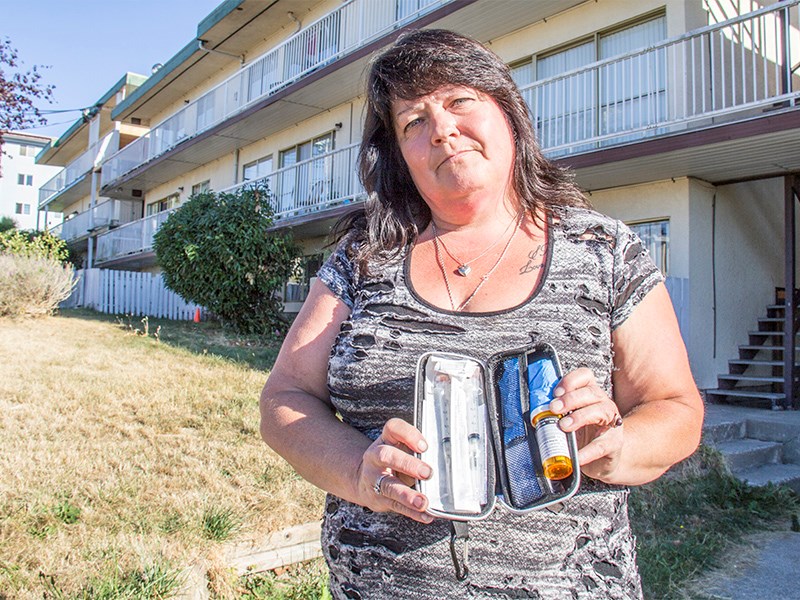As part of a global campaign, local International Overdose Awareness Day organizers plan to draw attention to drug overdoses within the region with a march from city hall to Willingdon Beach on Thursday, August 31, followed by speeches and prevention information.
According to Powell River and Sunshine Coast medical health officer Paul Martiquet, remoteness and isolation do not prevent drug overdoses and death from happening here.
“Powell River is not immune,” said Martiquet. “There are tainted opioids in Powell River and people have died because of it.”
Martiquet said six overdose deaths from heroin, fentanyl, morphine or prescription painkillers were recorded in Powell River in 2016, and 2017’s numbers will be even greater. One of those deaths was Darlana Treloar’s son Sean, who died in May 2016 at the age of 27 from a fentanyl overdose.
“I've been advocating since then because people need to know,” said Treloar. “There are lethal drugs here: fentanyl, heroin and meth, it's all here.”
Since 2001, International Overdose Awareness Day has been held in remembrance of people who have died from fatal drug overdoses and to emphasize that illicit drug use is not shameful or disgraceful. According to organizers, the event sends a message to members of the community that more needs to done, and more can be done.
“It's under the radar in Powell River,” said overdose prevention community convener Amanda Evans. “There's definitely a lot we can do to help people with overdose prevention, including more access to harm reduction as well as local and government-funded treatment and detox.”
Treloar and a group of volunteers whose lives have been directly impacted by drug overdoses have been instrumental in organizing the local overdose awareness event.
Activists and experts in public health and community medicine advocate for harm reduction, one of what is called the four pillars approach; other pillars include treatment, prevention and enforcement.
Harm reduction is one piece in dealing with the bigger picture of the opioid crisis, according to Martiquet.
“It involves the frame of mind or attitude that if we can't go for abstinence, and if people are going to do drugs, let's get them to do it in the safest manner possible,” he said.
Martiquet said the number of overdoses in Powell River is fewer than five so far in 2017, but the bigger picture in Vancouver suggests Powell River could see an increase in overdose deaths.
“The worst scenario is that it's going to go to 400 deaths just in Vancouver alone,” said Martiquet. “The situation is critical and Powell River users have to pay attention to that.”
Martiquet said users can take precautions prior to using opioids. Powell River has a needle-exchange program that gives users an alternative to sharing needles that transmit blood-borne diseases, including hepatitis and HIV, he added.
“A needle-exchange coordinator can tell users we have a particularly bad batch of fentanyl going through or the contacts of people who can help them get on methadone or suboxone and help them detox,” said Martiquet. “The message is: do not use alone and use less because you don't know what's in your dose.”
Not heeding those messages can lead to an overdose and Treloar is front and centre in calling for treatment and detox.
“We don't want to send people to Courtenay,” said Treloar. “My son ended up getting sent to Vancouver on a court-ordered treatment. He was scared and it didn't work out; we had to get him out of there.”
Martiquet said treatment and detox is not available everywhere in the province, including Powell River, and that it has to be addressed. But having those facilities is only part of the puzzle, he added.
“There are many pieces that have to be in place, especially detox immediately and exactly when the user needs it,” said Martiquet. “It is crucial.”
Naloxone overdose kits are just as critical as immediate responses in overdose situations and, fortunately, numerous kits have been distributed in Powell River, said Martiquet.
Naloxone reverses the effects of an opioid overdose. According to Martiquet, naloxone kits are located throughout Powell River, including at Powell River General Hospital, Community Resource Centre and Powell River Mental Health and Addiction Services.
In October 2016, take-home naloxone kits were also made available to patients being discharged from the hospital’s emergency department who are at risk of overdose.
Powell River-Sunshine Coast MLA Nicholas Simons, who is also chair of the new provincial Select Standing Committee on Children and Youth, said the committee will be looking at the opioid crisis in the context of support for youth.
“Many of those who have died have left behind young, dependant children; whether this has a measurable impact on the system that provides services to children and families is worth examining” said Simons. “What we really need is to end prohibition so we can get people off fentanyl-laced drugs, possibly through replacement treatments. Ultimately, we have to realize this is not a criminal justice issue but a policy one.”
International Overdose Awareness Day march begins at 6 pm on Thursday, August 31, at city hall and ends at Willingdon Beach. A naloxone demonstration will take place and overdose prevention information will be available at the beach, also starting at 6 pm.
“At 6:30 pm when the march arrives at the beach, there will be a tree-planting ceremony and speakers sharing stories about how they're affected by the overdose crisis,” said Evans. “Many people will be talking about how they have lost someone to overdose.”



